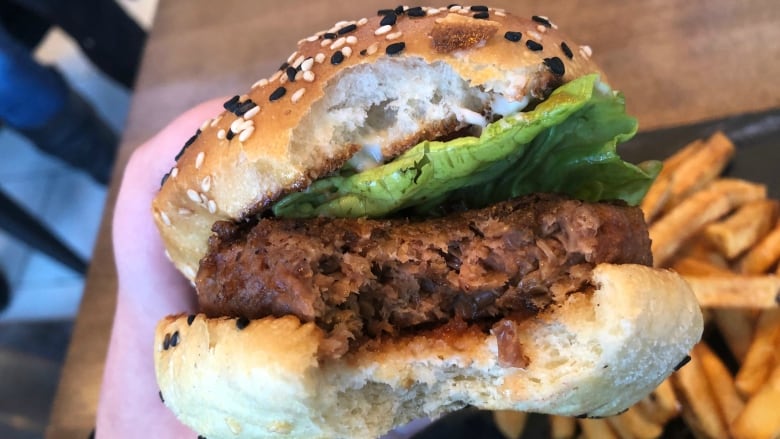Beyond Meat Drops Claims That Eating Meat Ups Risk of Heart Disease and Cancer

Beyond Meat has dropped the scary statistics about the health risks of eating meat that had been posted for months on it’s website, citing it dropped the details because it’s doing an update
by Sophia Harris – CBC News
The move follows complaints from critics that Beyond Meat was marketing its vegetarian burger as healthier than meat without the science to prove it. The California-based company said its message hasn’t changed; instead it’s revising the website to add more information.
“Improving human health is a core tenet of our brand,” said spokesperson Allison Aronoff in an email.
“The federation has so far achieved a partial win as restaurant chain A&W has agreed to change or remove any advertising referring to its Beyond burger as a meat product”
It appears that sometime after Sept. 11, Beyond Meat removed a startling graphic which stated that eating meat increases the chances of getting cancer by 16 per cent and the chances of developing heart disease by 21 per cent.
A footnote below the graphic said the numbers were associated with processed meats — which excludes fresh beef — and based on a scientific study. An internet search found that it was a Harvard Study published in 2012 and the processed meats subjects ate included hot dogs and bacon.
According to an internet archive search, sometime after Sept. 11, Beyond Meat removed this graphic from its website which included claims about the health risks of eating meat. (Beyond Meat)
The removed graphic also included statistics about how raising livestock harms the environment.A second colourful segment stating that plant-based proteins help improve human health and the environment remains on the site.
When asked about the missing graphic, Aronoff said Beyond Meat is changing things up.
“We are in the process of updating our website to share additional information around the multiple benefits of our products to further help consumers make an informed decision around the food they eat.”
In July, a CBC News story included a link to the now-removed statistics and quoted nutrition experts who said the evidence isn’t there — at least not yet — to declare that a processed plant-based burger is healthier than beef.
“Where is their research saying that — that this is better than eating a small, portion-controlled, lean piece of meat?” said Toronto-based dietitian and nutritionist Rosie Schwartz.
Food policy expert Sylvain Charlebois said a company can expect criticism when making claims based on science which is still in flux.
He points to a controversial new study where a team of international researchers concluded that adults don’t need to cut back on eating red and processed meat — because the purported health risks are small and uncertain.
“Science is not an absolute, things evolve,” said Charlebois, a professor at Dalhousie University specializing in food distribution and policy.
Beyond Meat stands by its health claims, telling CBC News that its plant-based products offer the “delicious taste” of meat, but with more protein and iron and less fat and no cholesterol.
It’s not meat
Beyond Meat’s burger has exploded in popularity with consumers looking for meat alternatives. But the company has also generated criticism for its marketing techniques.
Charlebois said Beyond Meat invited the controversy by making comparisons to meat.
“They provoke the marketplace,” he said. “If you start comparing your product with other products, you’re bound to make enemies.”
It’s not just nutrition experts who have raised questions. Canadian Cattle farmers have a beef with marketing that promotes the Beyond burger as “meat.”
The Quebec Cattle Producers Federation has filed two complaints with the Canadian Food Inspection Agency (CFIA) on the issue, and has the backing of the Canadian Cattlemen’s Association.
The first complaint, launched in January, took issue with A&W’s French-language ads which promoted the Beyond Meat burger sold in its restaurants as “fait de viande vegetale” or “vegetable-made meat.”
The federations’ second complaint, launched in May, objected to Beyond Meat referring to its burger as “plant-based meat” in promotional material and on product packaging in grocery stores.
The federation bases its complaints on CFIA’s definition of a meat product which states it must come from animal flesh.
“Meat is from a carcass. There’s nothing that says meat can be plant-based,” said Kirk Jackson, a cattle farmer and the vice-president of the Quebec Cattle Producers Federation.
“We just want a fair level playing field.”
He reports the federation has so far achieved a partial win as restaurant chain A&W has agreed to change or remove any advertising referring to its Beyond burger as a meat product.
The company’s current French slogan for the burger is “vrai bon burger” or “truly good burger.”
Jackson believes the outcome is a positive sign that the federation will also be successful in getting Beyond Meat to stop calling its product a plant-based meat.
“I’m hoping it’s going to be like this [outcome],” he said. “It’s just abiding by the rules.”
Both A&W and CFIA declined to comment on the issue. Beyond Meat told CBC News in May that it “takes regulatory compliance very seriously” and is “reviewing internally to ensure we comply with Canadian regulations.”
Sophia Harris has worked as a CBC video journalist across the country, covering everything from the start of the annual lobster fishery in Yarmouth, N.S., to farming in Saskatchewan. She now has found a good home at the business unit in Toronto. Contact: sophia.harris@cbc.ca












